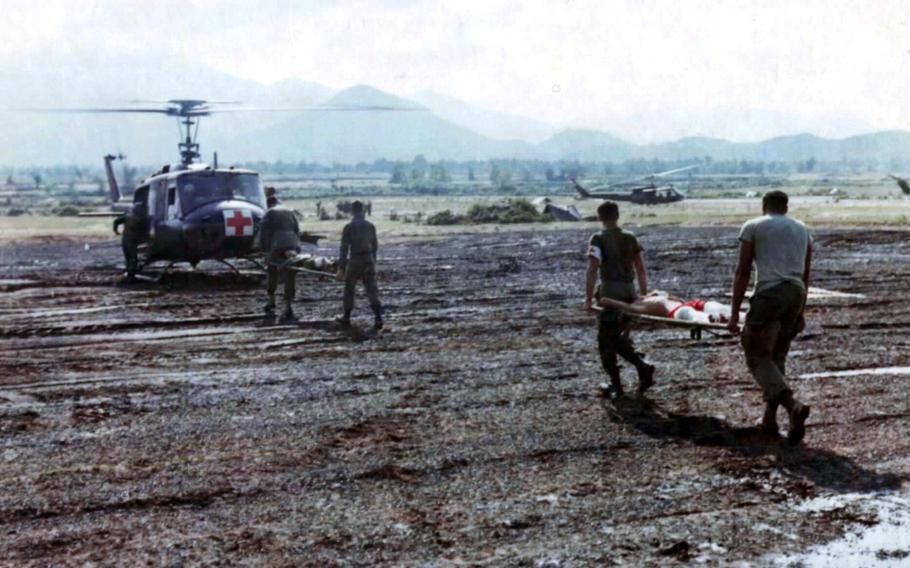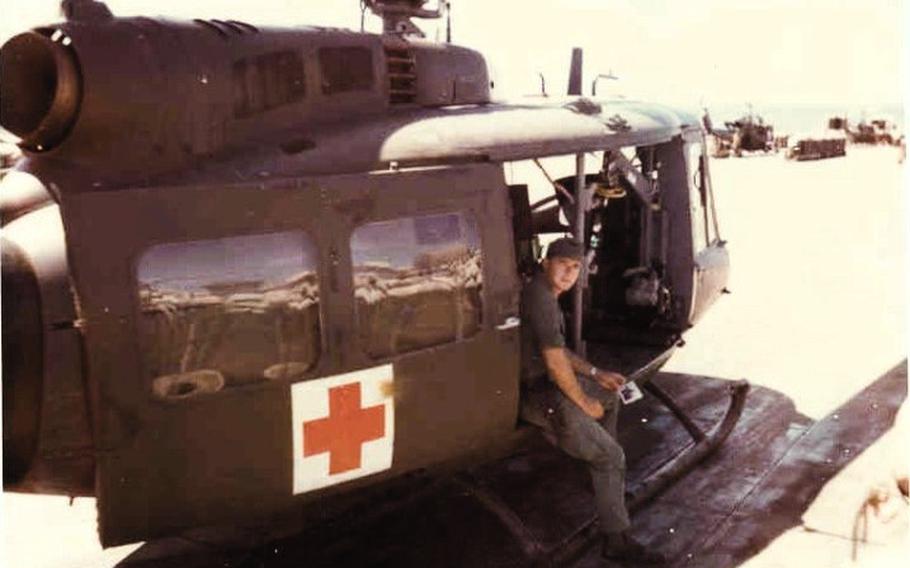
Stretcher-bearers in September 1966 carry wounded to “Dustoff” medevac helicopters at a 1st Air Cavalry base near Qui Nhon in Vietnam on the South China Sea, about 375 miles northeast of Saigon. (Lawrence J. Sullivan/National Museum of the United States Army)
Vietnam War medevac helicopter crews will be the latest military group to receive the highest award Congress can bestow.
The Dustoff Crews of the Vietnam War Congressional Gold Medal Act won final approval this week. It honors the estimated 3,000 pilots, medics, and crew who flew between combat zones and field hospitals during the war.
The flights were nicknamed “Dustoff” because of the dirt and debris churned up by their helicopter rotors as they landed to pick up wounded. The crew of a helicopter early in the war took the name as their call-sign, according to the Army.
The Dustoffs extracted 900,000 wounded U.S., Vietnamese, and allied soldiers from May 1962 to March 1973. The Army said the medevac crews had a one-in-three chance of becoming casualties themselves.
“They were some of the very best, and their heroism deserves to be recognized, which we finally did [Thursday] by sending this legislation to President [Joe] Biden’s desk to become law,” said Rep. Cathy McMorris Rodgers, R-Wash., a co-sponsor of the legislation.
Congressional testimony included the record of the 54th Medical Detachment, a Dustoff unit of about 30 soldiers with three UH-1 Huey helicopters. During one 10-month stretch of heavy fighting, they extracted 21,435 casualties to safety. The 8,644 evacuation and rescue missions required 4,832 hours in the air. Unit members received 78 valor awards.
Patrick Henry Brady of Seattle was an Army major flying missions with the 54th Medical Detachment from Chu Lai, about 340 miles northeast of Saigon on the coast of the South China Sea. In January 1968, calls came in from groups of wounded soldiers who were trapped behind enemy lines, including one group in a mine field. Despite heavy fog and smoke, Brady extracted soldiers from a site where two early rescue helicopters had been shot down. Returning several times to pull more soldiers out of the jungle, Brady had one helicopter shredded by machine gun fire and a second damaged at the mine field by an explosion. At the end of the day, Brady and his crew had lost three helicopters and saved 51 wounded American and South Vietnamese soldiers.

Army Maj. Patrick Henry Brady, in an undated photo, served as a “Dustoff” medical evacuation pilot during the Vietnam War. He received the Medal of Honor for valor during a dangerous landing to pick up wounded soldiers in January 1968. He retired from the service as a major general. (Congressional Medal Of Honor Society)
Brady received the Medal of Honor, the nation’s highest award for valor in combat.
“A Dustoff was usually vulnerable,” he said. “Of course, the most dangerous time was landing on the battlefield during the battle. The chopper was big and visible -- no armor protection.”
Brady said despite the red cross painted on the Dustoffs to show they weren’t combat helicopters, they nonetheless always drew enemy fire.
“We knew it and we were never surprised,” he said. “We did all we could to avoid it. That meant finding the safest way in, taking the shortest time on the ground possible and getting the patient to the hospital as soon as we could.”
Vietnam Dustoff Association President Steve Vermillion said the Congressional Gold Medal recognized the history of what were often teenagers involved in a life and death mission all day, nearly every day.
“[It’s] the story of 18- and 19-year-old men flying unarmed helicopters into battle, at night, in the rain, and multiple times a day, to rescue our wounded and fly them back to medical facilities,” he said.
The Congressional Gold Medal requires two-thirds of each chamber to support the bill. In the Democratic-controlled Senate, 71 of 100 senators signed on as co-sponsors. In the Republican-controlled House, 330 of the 435 members endorsed the legislation. The final votes this week sent the legislation to Biden. The White House said Thursday that he planned to sign the bill into law.
The Congressional Gold Medal was first awarded in 1776 to Gen. George Washington for his service in the early days of the American Revolution. In the 248 years since, it has gone to more than 300 individuals and organizations, such as the American Red Cross.
Top American generals, from Horatio Gates in the Revolutionary War to Norman Schwarzkopf in Operation Desert Storm, have received the medal.
In the past two decades, Congress has honored various groups such as the Native American code talkers from World War II who translated secret orders and other messages into their native language, which Japanese troops in the Pacific could not understand. Other medal recipients included the Montford Point Marines, the first Black troops to serve in the branch, the “Monuments Men,” experts recruited by the Army to find art stolen by the Nazis, and Merrill’s Marauders, World War II Army commandos who fought behind enemy lines in Burma.
The Congressional Gold Medal has also gone to artists, explorers, astronauts, politicians, and business leaders. Recipients have included the Wright Brothers, Bob Hope, Joe Louis, Robert Frost, Frank Sinatra, and Mother Teresa.
Each medal is created with a unique design from the U.S. Mint honoring the recipient. In the case of groups such as the Dustoff crews, only one gold medal is produced. The one medal for groups is usually displayed at the Smithsonian Institution or other public display space. The law firm Hunton Andrews Kurth, which assisted the effort to obtain the medal for the Dustoff crews, said the veterans had chosen the U.S. Army Medical Department Museum in Fort Sam Houston, Texas, to display the medal.